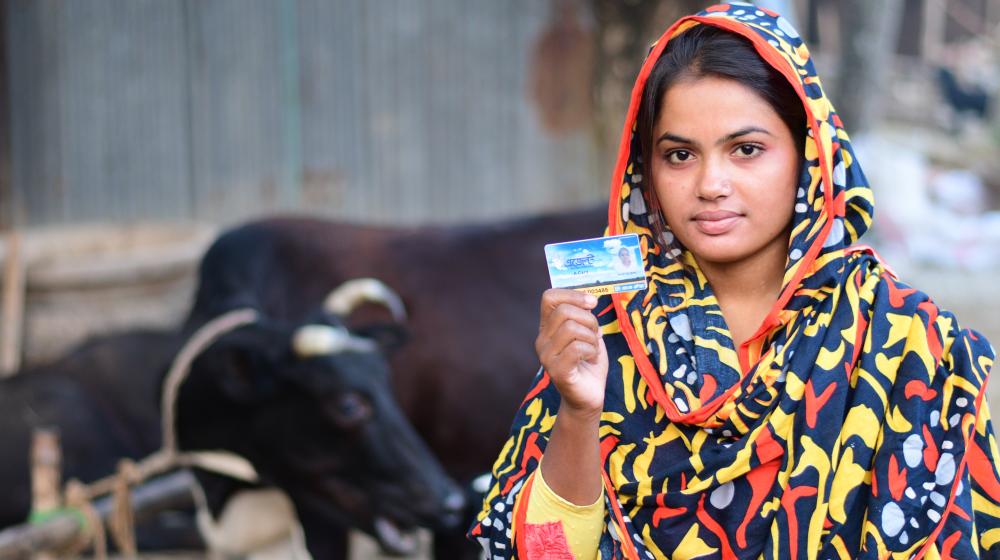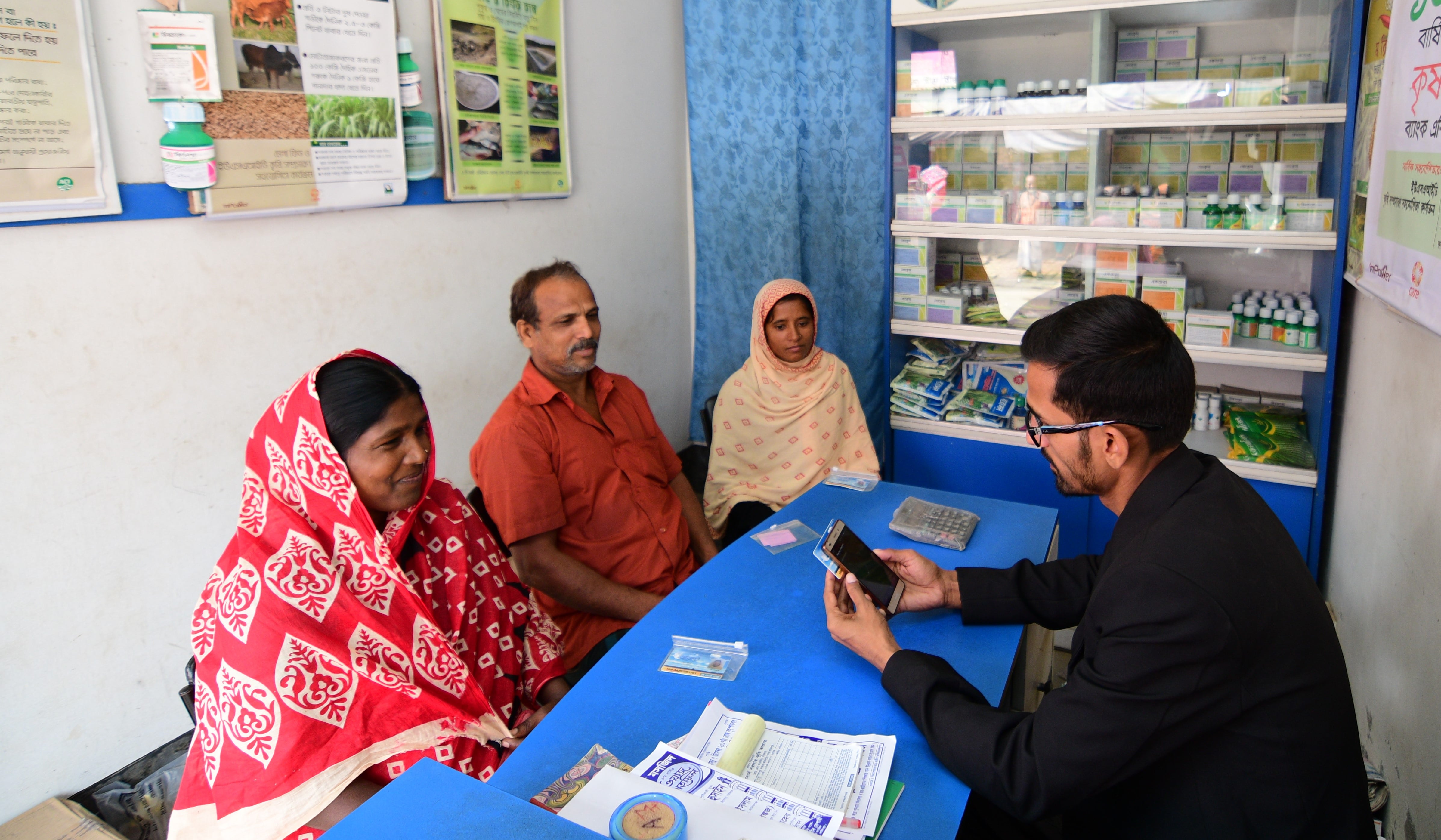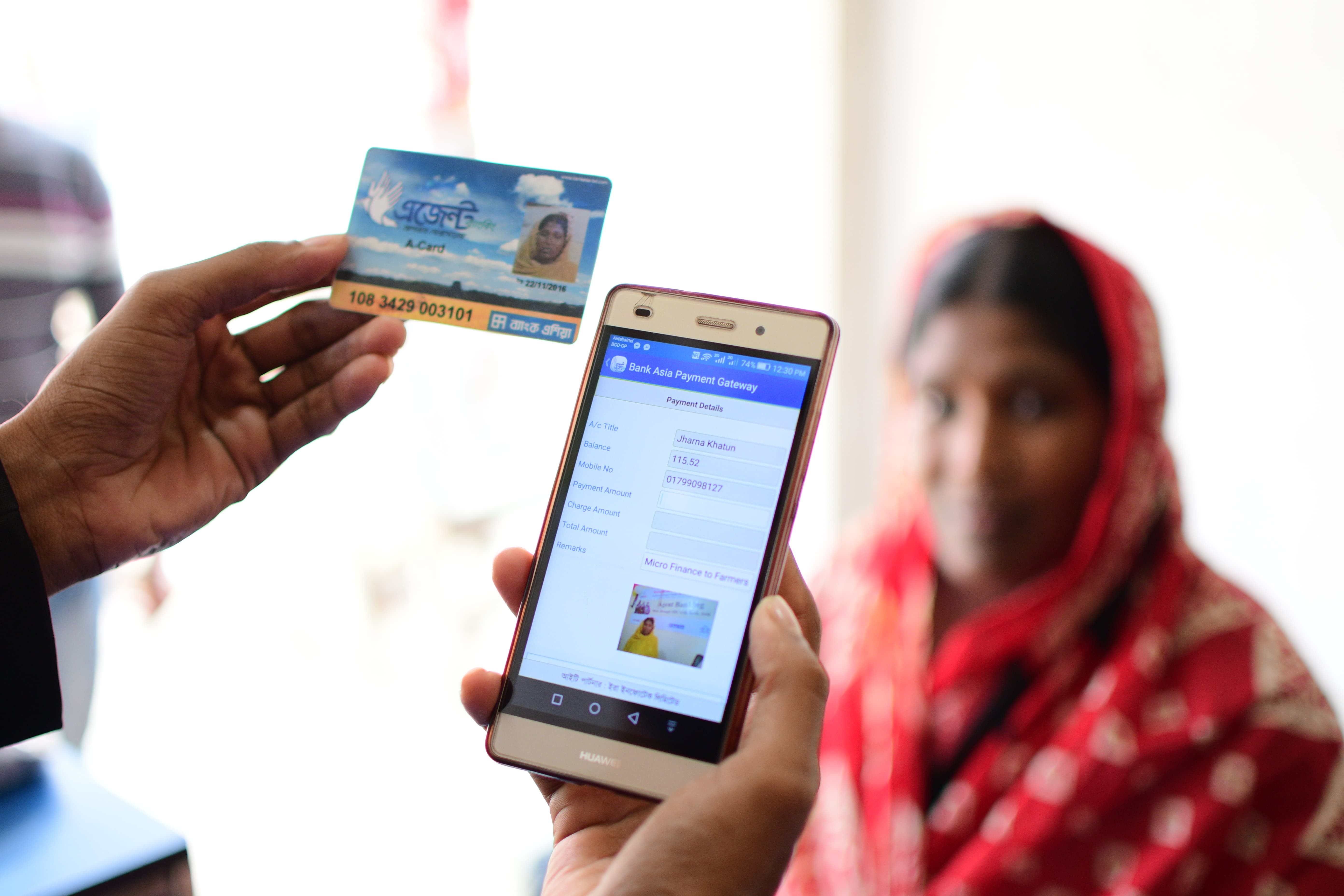Dec 10, 2018 | by Tania Sharmin & Emily Janoch, CARE

The A-Card. Photo credit: Akram Ali, CARE Bangladesh
This blog was originally published on FinDev Gateway website. We are pleased to share it here with the SEEP community.
Despite the wide availability of microcredit in Bangladesh now, there are still millions of farmers who are unable to benefit from these loans. Repayment plans are not flexible, microfinance institutions (MFIs) require collateral, and existing loans have high-interest rates, which according to our estimates range from 25% for MFI loans up to 200% from local money lenders. Additionally, cash loans make it easy for family members to pressure farmers into spending loan money for other needs like food, clothes and school fees. Once the loan goes into consumption, it makes it hard to repay because there is no additional income.
To address all these obstacles, the Agriculture Card, or A-Card, was designed. More than just a card, A-Card is a new financial model which promotes financial inclusion for smallholder farmers, especially women, by introducing an agricultural loan product with flexible payment terms matched to agricultural production cycles.
The A-Card business model is based on a digitized four-way linkage between the smallholder farmers, commercial banks, MFIs which act as agent banks, and farm input retailers. The commercial bank enters into a bilateral agreement with the MFI regarding profit-sharing from this arrangement. The bank provides the loan to farmers at an annual interest rate of less than 10 percent, with a flexible repayment within a six-month term, unlike standard MFI loans which generally have an annual percentage rate of 25-31 percent and require weekly repayments. The MFI guarantees the loan by maintaining a fixed term deposit with the bank. It also monitors loan repayments and provides capacity building for farmers. Farmers use their land size and crop choice to calculate what inputs they need, and to apply for loans.

Photo credit: Akram Ali, CARE Bangladesh
Through a Near Field Communication (NFC) technology-based debit card, banks issue an easily accessible debit card-based loan for the smallholder farmers. Local banking agents distribute the cards and provide follow-up. Farmers can go to certified agro-retailers and service providers and use their card to purchase agricultural inputs such as seeds, fertilizers, livestock feed, irrigation, animal vaccination and machinery. Service providers use their NFC-enabled mobile phone to transfer money from the farmer’s account. A-Card thus engages three different stakeholders on one platform - commercial banks, local banking agents and agro-retailers. The system is fully digitized, and fingerprint-scan technology, text message confirmation, and photos on the card provide additional security.
The A-Card model also offers a variety of non-credit services – savings, fixed-term deposits, intra-bank transfers, insurance, and remittance services – to meet the diverse financial needs of smallholder households. Non-financial services include financial education and business planning for smallholder farmers.
By using the A-Card, farmers increase their production and income. Buying inputs in a timely manner means they can use them at the right time in the season, resulting in higher productivity. The longer repayment time means farmers get better prices because they can store crops for a longer period of time and sell at a higher price. Input retailers also see benefits because they no longer have to sell on credit. Instead, input cost is directly credited to retailers’ accounts when they sell to A-Card users.
The A-card also supports women’s empowerment. Because fingerprint and photo security put women directly in control of their cards, other family members can’t pressure them to spend the money in other ways. It also allows women to get easy access to credit and inputs, which has been a big barrier for women in Bangladesh.

Photo credit: Akram Ali, CARE Bangladesh
The introduction of the A-Card has not been without its challenges. We have found that MFIs sometimes experience a conflict of interest between offering A-Card and microfinance loans. Since MFIs earn only a 1 percent profit on A-Card and a 25 percent profit on standard loans, they have more incentive to push standard products on customers instead of offering the A-Card. To avoid this, the team is experimenting with individual local market actors like input retailers or Local Service Providers as a banking agent for this pilot.
Another lesson learned from the A-Card is that local bank staff didn’t have incentives to sell this product because it was not tied to their performance goals. We are currently working with banks to develop new incentive structures to overcome this.
An individual study shows that farmers who have an A-Card are using proper agricultural practices, resulting in an average 25 percent increase of their production and income. It also found that the model not only helps farmers but also local retailers who are engaged with this system, as they are able to increase their customers and sales by around 20 percent. Banks and agents also benefit as they acquire additional clients.
Tania Sharmin is Senior Team Leader – JANO (Joint Action for Nutrition Outcome) at CARE Bangladesh. Emily Janoch is Senior Technical Advisor Knowledge MGT RSRC, Global Food & Nutrition Team, CARE-USA. They presented the A-Card in a Peer Learning Session at the 2018 SEEP Annual Conference.
Categories: South Asia English Blog Agriculture & Food Security Blog WebinarsBlogs

1621 North Kent Street, Ste 900,
Arlington, VA, 22209
P 202.534.1400
F 703.276.1433
Website Photos: © mari matsuri
